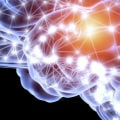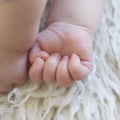Although autism is difficult to diagnose before the age of 24 months, it is possible to detect signs of the disorder in babies as young as 2 months old. The American Academy of Pediatrics (AAP) recommends that babies undergo routine developmental screening at all visits and screening for developmental delay when they are 9, 18, and 24 or 30 months old. If signs are detected at 18 months of age, intensive treatment can help reconfigure the brain and reverse symptoms. At 4 months, babies diagnosed with autism may prefer higher amounts of visual stimulation than other babies their age. Two studies have found, for example, that babies who show more attention to the mouth region in relation to the eyes have superior language skills when they are young children.
Babies with autism sometimes do not communicate through sounds or gestures and may not respond to social stimulation. In contrast, babies who were not diagnosed with the disorder later become more interested in the eyes during the same period. More research is needed to confirm whether full-term, healthy babies who are later diagnosed with autism show similar types of abnormalities early on. However, a study published in the September issue of Pediatrics identified 28 babies who spent time in the neonatal intensive care (NICU) and were later diagnosed with autism spectrum disorder. The researchers found that these babies were more likely to have abnormal muscle tone and differences in their visual processing than babies who developed normally after some time in the care unit. Approximately 40 percent of infants subsequently diagnosed with autism showed abnormalities in the way they tracked visual objects compared to approximately 10.5 percent of infants who did not receive a diagnosis of autism.
More than half of babies subsequently diagnosed with autism had an abnormal tone in their arms, either too loose or too stiff, compared to 22 percent of babies who developed normally. If the answers suggest that your child has a high chance of autism, talk to your child's doctor. Early indicators of autism in infants and young children may include avoidance of eye contact, delays in language development, and limited facial expressions. Intensive treatment can help reconfigure the brain and reverse symptoms if signs are detected at 18 months of age.





Leave a Comment